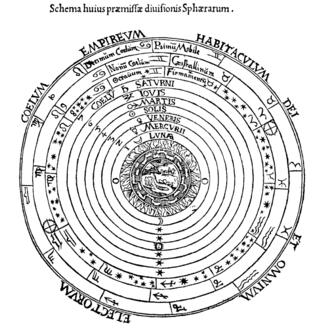
Plato, born Aristocles, was an ancient Greek philosopher of the Classical period who is considered a foundational thinker in Western philosophy and an innovator of the written dialogue and dialectic forms. He raised problems for what became all the major areas of both theoretical philosophy and practical philosophy, and was the founder of the Platonic Academy, a philosophical school in Athens where Plato taught the doctrines that would later become known as Platonism.

Prudence is the ability to govern and discipline oneself by the use of reason. It is classically considered to be a virtue, and in particular one of the four cardinal virtues. Prudentia is an allegorical female personification of the virtue, whose attributes are a mirror and snake, and who is frequently depicted as a pair with Justitia, the Roman goddess of Justice.
Ancient Greek philosophy arose in the 6th century BC. Philosophy was used to make sense of the world using reason. It dealt with a wide variety of subjects, including astronomy, epistemology, mathematics, political philosophy, ethics, metaphysics, ontology, logic, biology, rhetoric and aesthetics. Greek philosophy continued throughout the Hellenistic period and later evolved into Roman philosophy.
Eudaimonia, sometimes anglicized as Eudaemonia, Eudemonia or Eudimonia, is a Greek word literally translating to the state or condition of good spirit, and which is commonly translated as happiness or welfare.

Virtue ethics is a philosophical approach that treats virtue and character as the primary subjects of ethics, in contrast to other ethical systems that put consequences of voluntary acts, principles or rules of conduct, or obedience to divine authority in the primary role.
In most contexts, the concept of good denotes the conduct that should be preferred when posed with a choice between possible actions. Good is generally considered to be the opposite of evil and is of ethics, morality, philosophy, and religion. The specific meaning and etymology of the term and its associated translations among ancient and contemporary languages show substantial variation in its inflection and meaning, depending on circumstances of place and history, or of philosophical or religious context.

Arete is a concept in ancient Greek thought that, in its most basic sense, refers to "excellence" of any kind—especially a person or thing's "full realization of potential or inherent function." The term may also refer to excellence in "moral virtue."

The Nicomachean Ethics is Aristotle's best-known work on ethics: the science of the good for human life, that which is the goal or end at which all our actions aim. It consists of ten sections, referred to as books, and is closely related to Aristotle's Eudemian Ethics. The work is essential for the interpretation of Aristotelian ethics.
In philosophy, episteme is knowledge or understanding. The term epistemology is derived from episteme.
In Ancient Greek philosophy, Phronesis is a type of wisdom or intelligence concerned with practical action. It implies both good judgment and excellence of character and habits. Classical works about this topic are still influential today. In Aristotelian ethics, the concept was distinguished from other words for wisdom and intellectual virtues—such as episteme and sophia—because of its practical character. The traditional Latin translation is prudentia, which is the source of the English word "prudence".
The goldenmean or golden middle way is the desirable middle between two extremes, one of excess and the other of deficiency. It appeared in Greek thought at least as early as the Delphic maxim "nothing in excess", which was discussed in Plato's Philebus. Aristotle analyzed the golden mean in the Nicomachean Ethics Book II: That virtues of character can be described as means. It was subsequently emphasized in Aristotelian virtue ethics. For example, in the Aristotelian view, courage is a virtue, but if taken to excess would manifest as recklessness, and, in deficiency, cowardice. The middle way form of government for Aristotle was a blend between monarchy, democracy and aristocracy.
Aristotle first used the term ethics to name a field of study developed by his predecessors Socrates and Plato which is devoted to the attempt to provide a rational response to the question of how humans should best live. Aristotle regarded ethics and politics as two related but separate fields of study, since ethics examines the good of the individual, while politics examines the good of the city-state, which he considered to be the best type of community.

Nous, from Greek: νοῦς, is a concept from classical philosophy, sometimes equated to intellect or intelligence, for the faculty of the human mind necessary for understanding what is true or real.
Diairesis is a form of classification used in ancient logic that serves to systematize concepts and come to definitions. When defining a concept using diairesis, one starts with a broad concept, then divides this into two or more specific sub-concepts, and this procedure is repeated until a definition of the desired concept is reached. Aristotle makes extensive use of diaresis in categorization as basis for syllogizing. He makes clear, however, that definition by diaresis does not in itself prove anything. Apart from this definition, the procedure also results in a taxonomy of other concepts, ordered according to a general–specific relation.
This page is a list of topics in ancient philosophy.
David Neil Sedley FBA is a British philosopher and historian of philosophy. He was the seventh Laurence Professor of Ancient Philosophy at Cambridge University.
C. D. C. Reeve is a philosophy professor at the University of North Carolina at Chapel Hill. He works primarily in Ancient Greek philosophy, especially Plato and Aristotle. He has also published work in the philosophy of sex and love, and on film. He has translated many Ancient Greek texts, mostly by Plato and Aristotle.
Richard Kraut is the Emeritus Charles and Emma Morrison Professor in the Humanities at Northwestern University and a specialist in ancient Greek philosophy.
Intellectual courage falls under the philosophical family of intellectual virtues, which stem from a person's doxastic logic.
Thomas Kjeller Johansen is a Danish-Norwegian philosopher and Professor of Philosophy at the University of Oslo. He is known for his works on ancient philosophy and serves as the co-editor of Phronesis. He is perhaps most well-known for his book on Plato's Timaeus, Plato's Natural Philosophy.







